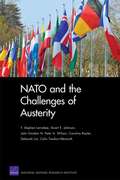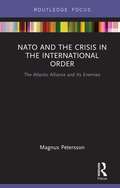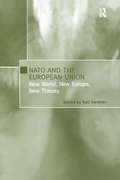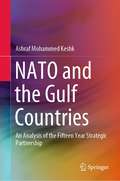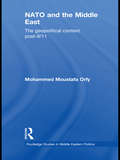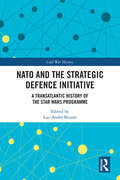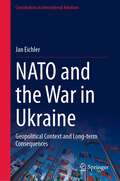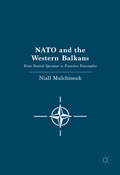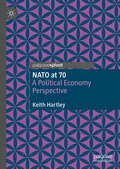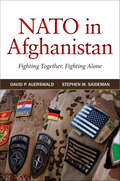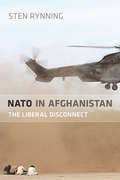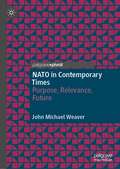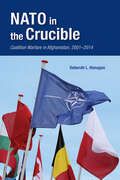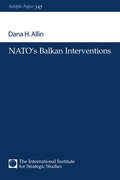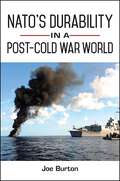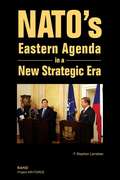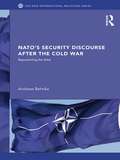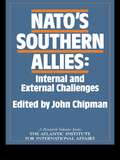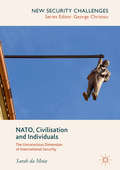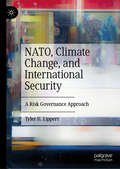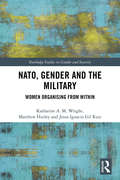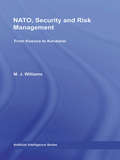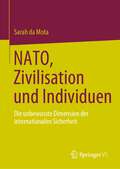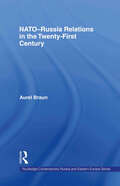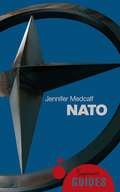- Table View
- List View
NATO and the Challenges of Austerity
by Stuart E. Johnson F. Stephen Larrabee Peter A. Wilson John Gordon Iv Deborah Lai Caroline Baxter Calin Trenkov-WermuthIn the coming decade, NATO faces growing fiscal austerity and declining defense budgets. This study analyzes the impact of planned defense budget cuts on the capabilities of seven European members of NATO:the United Kingdom, France, Germany, Italy, Spain, the Netherlands, and Poland. The authors assess the implications of the cuts for NATO capabilities and strategy and for U. S. policy.
NATO and the Crisis in the International Order: The Atlantic Alliance and Its Enemies
by Magnus PeterssonThe main objectives of this book are to analyse the risks and dangers NATO faces in the current strategic environment and to discuss how the alliance can readjust to those challenges. How can NATO adapt to the dangerous combination of a revisionist Russia, a reluctant United States, and a Europe in crisis? NATO’s relevance and ability to survive have been challenged many times before, and it has not only survived but also has proven highly adaptable to change. This has been good for Western cohesion and for the consolidation of the liberal-democratic, rules-based world order. The main argument of this book is that NATO can overcome this latest set of challenges as well and retain its central role as a cornerstone of the European and transatlantic security order. NATO is different from other alliances because its members share not only interests but values as well, codified in the preamble of the North Atlantic Treaty as allied support for democracy, individual liberty, and the rule of law. The greatest enemy of the alliance is the forces that challenge the common norms and values of NATO’s member states, and – in a larger perspective – the liberal-democratic, rules-based world order, and Western civilisation itself. The book makes an original contribution to the existing literature on NATO and transatlantic relations and discusses the latest developments within NATO since the Trump administration took office. The book will be of much interest to students of NATO, geopolitics, security studies, and International Relations in general.
NATO and the European Union: New World, New Europe, New Threats
by Hall GardnerThe perspectives of academics and practitioners are brought together in this insightful work, which examines the war on terrorism, the Iraq war and the roles of NATO and the EU. The book analyzes the new threats posed by terrorist strikes and the proliferation of weapons of mass destruction despite the total failure of Cold War conceptions of deterrence. It also delineates the key issues and problems that have arisen from the NATO and EU double enlargement and from the new NATO-Russian relationship. Casting light on the global and regional ramifications of the crisis, as well as the tensions in the transatlantic relationship caused by the war with Iraq, NATO and the European Union addresses the key policy questions that concern the maintenance of global peace and security.
NATO and the Gulf Countries: An Analysis of the Fifteen Year Strategic Partnership
by Ashraf Mohammed KeshkThis book analyses the fifteen-year-long strategic partnership between NATO and the Gulf Cooperation Council (GCC). The book goes on to address several key questions raised in the year since the inception of the Istanbul Cooperation Initiative (ICI): Is the initiative a framework for consultation on Gulf and regional security issues? Is it a security initiative or a defensive one? Even more importantly, how was this initiative developed? Was there a mutual eagerness, on the part of NATO or that of the four Gulf States, to develop it? Is it possible for the initiative to be redeveloped and have other dimensions and outlooks in the future? Throughout the book, the author provides a comprehensive understanding and assessment of NATO's policies and their impact on the security of the Arab Gulf region.
NATO and the Middle East: The Geopolitical Context Post-9/11 (Routledge Studies in Middle Eastern Politics)
by Mohammed Moustafa OrfyDespite having been active in the region since the mid-1990s, the role of NATO in the Middle East has attracted particular attention since the events of 11th September 2001. This book analyses the limits of NATO’s role in the Middle East region and examines whether or not the Alliance is able to help in improving the fragile regional security environment through cooperative links with select Middle Eastern partners. The author reviews the strategic importance of the region from a Western perspective and why it has become a source of instability in world politics, looks at US and international initiatives to counteract this instability, and charts the development of NATO in this context. He also examines NATO’s role with regard to two pressing Middle Eastern crises, Iraq and Darfur, assessing whether or not this role has been consistent with, if not an expression of, US strategic interests. A comprehensive examination of the impacts of 9-11 events on world security and the development of NATO’s role in the Middle East, this book will be an important addition to the existing literature on security and strategic affairs, US foreign policy, Middle Eastern politics, European politics, and terrorism studies.
NATO and the Strategic Defence Initiative: A Transatlantic History of the Star Wars Programme (Cold War History)
by Luc-André BrunetThis book explores the largely neglected issue of responses to the US Strategic Defence Initiative (SDI, or the 'Star Wars' missile defence programme) across NATO. The chapters here explore the reactions of different Western allies to the announcement of the SDI in 1983 and especially the 1985 invitation to participate. While existing studies have explored the origins of the American programme and the role it may have played in ending the Cold War, this volume breaks new ground by considering the impact of the SDI on transatlantic relations in the 1980s. Based on newly available archival sources, this volume re-evaluates the responses of eight NATO member-state governments, as well as the Soviet leadership, to the SDI. In addition to looking at ‘top-down’ governmental reactions, the volume also explores the ‘bottom-up’ response to the SDI of civil society and peace activists on both sides of the Atlantic. The volume examines how the American initiative – derisively named ‘Star Wars’ by its detractors – provoked a crisis in relations with its allies during the final decade of the Cold War and how those tensions within NATO were ultimately resolved. This book will be of much interest to students of Cold War history, strategic studies, foreign policy and international history.
NATO and the War in Ukraine: Geopolitical Context and Long-term Consequences (Contributions to International Relations)
by Jan EichlerThis book presents a fresh perspective on the geopolitical landscape surrounding NATO's enlargement, aptly termed "expansion by invitation." Looking beyond conventional narratives, it unravels the multifaceted outcomes of this process, extending beyond the initial optimism. While acknowledging the merits of NATO's expansion, the book scrutinizes its contentious side effects, notably the escalating militarization of the Baltic and Black Sea regions, heightened military expenditure, shifts toward offensive doctrines, and the surge in military exercises and incidents between NATO and Russia. In a world witnessing a renewed bipolarization akin to the Cold War era, the book underscores the need for NATO and Russia to de-escalate tensions and strive towards a transition from contemporary negative peace to a more constructive, positive peace. Devoid of bias, this book refrains from condemning the expansion process but rather calls for an acknowledgment of its consequences. It is an indispensable resource for academics seeking a nuanced understanding of NATO's expansion, challenging prevailing terminologies and offering insights into the complex dynamics of international security in Europe.
NATO and the Western Balkans
by Niall MulchinockThis book provides a critical examination of NATO's evolving strategic and operational roles in the Western Balkans since the disintegration of Yugoslavia in 1991, with a particular focus on Bosnia, Kosovo and the former Yugoslav Republic of Macedonia, in both the conflict and post-conflict phases. While there is a myriad of literature available on the various conflicts that engulfed the former Yugoslavia after the collapse of communism, less has been written on NATO's overall role in these conflicts. This text, therefore, fills the gap, offering a thematic study of NATO's roles and duties in this region from the early 1990s to the present day. The 'levels of analysis' introduced by Mulchinock provide a new framework for examining NATO's response to the Yugoslav wars of secession, focusing on the role of key NATO member states and the role of different NATO Secretaries-General, along with the impact of inter-institutional cooperation (and conflict) with other international organisations.
NATO at 70: A Political Economy Perspective
by Keith HartleyNATO is facing a unique crisis questioning its existence and future. This book provides a detailed in-depth economic and critical analysis of the issues. It considers whether NATO has a future and what it might look like 70 years ahead. NATO is undergoing a process of dramatic change, reorganising its functions, funding and strategic responsibilities to address growing regional and global threats. This book not only explores the contentiousness of economic and financial burden-sharing and the associated political and diplomatic stresses involved in the pursuit of common strategic objectives, but contributes to a further debate concerning the expanded scope and roles of the Alliance in the 21st century. This book combines NATO’s political controversies, complexities and conflicts with a treatment of the underlying theoretical economic frameworks. This book is essential reading for students in military staff colleges, university International Relations and Strategic Affairs Departments, but also to those working in government defence establishments, independent think tanks and political and economic institutions, generally.
NATO in Afghanistan: Fighting Together, Fighting Alone
by David P. Auerswald Stephen M. SaidemanModern warfare is almost always multilateral to one degree or another, requiring countries to cooperate as allies or coalition partners. Yet as the war in Afghanistan has made abundantly clear, multilateral cooperation is neither straightforward nor guaranteed. Countries differ significantly in what they are willing to do and how and where they are willing to do it. Some refuse to participate in dangerous or offensive missions. Others change tactical objectives with each new commander. Some countries defer to their commanders while others hold them to strict account.NATO in Afghanistan explores how government structures and party politics in NATO countries shape how battles are waged in the field. Drawing on more than 250 interviews with senior officials from around the world, David Auerswald and Stephen Saideman find that domestic constraints in presidential and single-party parliamentary systems--in countries such as the United States and Britain respectively--differ from those in countries with coalition governments, such as Germany and the Netherlands. As a result, different countries craft different guidelines for their forces overseas, most notably in the form of military caveats, the often-controversial limits placed on deployed troops. Providing critical insights into the realities of alliance and coalition warfare, NATO in Afghanistan also looks at non-NATO partners such as Australia, and assesses NATO's performance in the 2011 Libyan campaign to show how these domestic political dynamics are by no means unique to Afghanistan.
NATO in Afghanistan: The Liberal Disconnect
by Sten RynningThe war in Afghanistan has run for more than a decade, and NATO has become increasingly central to it. In this book, Sten Rynning examines NATO's role in the campaign and the difficult diplomacy involved in fighting a war by alliance. He explores the history of the war and its changing momentum, and explains how NATO at first faltered but then improved its operations to become a critical enabler for the U. S. surge of 2009. However, he also uncovers a serious and enduring problem for NATO in the shape of a disconnect between high liberal hopes for the new Afghanistan and a lack of realism about the military campaign prosecuted to bring it about. He concludes that, while NATO has made it to the point in Afghanistan where the war no longer has the potential to break it, the alliance is, at the same time, losing its own struggle to define itself as a vigorous and relevant entity on the world stage. To move forward, he argues, NATO allies must recover their common purpose as a Western alliance, and he outlines options for change.
NATO in Contemporary Times: Purpose, Relevance, Future
by John Michael WeaverThis book builds on the six years of hands-on experience that the author had while working in the North Atlantic Treaty Organization. It provides an overview and history of NATO, looks at the political and military components of the Alliance, as well as the military command from the perspective of real-world contemporary NATO operations and planning. The author also looks at the military training, lessons, and exercise components and how it prepares forces to support upcoming NATO Response Force (NRF) rotations to ensure that NATO is a viable threat deterrent and responsive organization to both Article 5 and non-Article 5 operations. This book will serve as a primer into the world’s longest enduring Alliance and one that has made an impact on real world operations over the last 20 years in Europe (Bosnia and Kosovo), Africa (Libya), Asia (Afghanistan and Pakistan), and the Middle East (Iraq).
NATO in the Crucible: Coalition Warfare in Afghanistan, 2001–2014
by Deborah L. HanaganWhen the North Atlantic Treaty Organization (NATO) became involved in security operations during the War in Afghanistan, it faced a range of complex challenges, including a highly motivated Afghan insurgency that changed over time and repeatedly defied assumptions.Conflicts within NATO also posed challenges. The alliance brought together a quarter of the world's nations, each with its own goals and interests, in an effort to stabilize an agrarian country that posed no immediate security threat. For more than a decade, through changes in leadership and strategy, the nations experienced bitter disagreements, resentments, and a conflict that escalated to a level of violence and uncertainty few had anticipated.In NATO in the Crucible, Deborah Lynn Hanagan analyzes these challenges and explains how the alliance maintained cohesion despite them. She examines why NATO succeeded in Afghanistan when history suggests most coalitions fracture under such intense pressure. In the end, she argues, member nations summoned the political will and organizational capacity to cooperate and endure. And they agreed, above all, that failure in Afghanistan would be catastrophic—both for NATO and for the world.
NATO's Balkan Interventions (Adelphi series #347)
by Dana H. AllinExamines NATO's Balkan interventions over the entire decade starting with the break-up of Yugoslavia in 1992. Focusing on the wars in Bosnia and Kosovo, it traces the record of early transatlantic failures and later successes as once bitterly divided allies were able, finally, to unite around some basic principles. By the time of the Kosovo intervention in spring 1999, the allies agreed on the necessity of taking sides and using military force in conflicts that were complicated, but far from morally opaque. The book concludes with some lessons around which the transatlantic allies might reasonably hope - despite other pressing concerns - to stay engaged and stay united.
NATO's Durability in a Post-Cold War World (SUNY series, James N. Rosenau series in Global Politics)
by Joe BurtonWhy is it that despite the end of the Cold War and the almost constant controversies surrounding the alliance's role in the world, the North Atlantic Treaty Organization (NATO) is still a prominent and vital player in international security? Joe Burton provides an in-depth analysis of NATO's changing role in the post–Cold War era and its ability to survive, adapt, and meet the needs of its members in an increasingly turbulent, globalized security environment. He offers a historically and theoretically informed account of NATO that isolates the core dynamics that have held the alliance together in troubled times. In particular, he examines a series of processes and events—from the 1990 Gulf War to the rise of the Islamic State—that help explain NATO's continuing relevance.
NATO's Eastern Agenda in a New Strategic Era
by F. Stephen LarrabeeNATO's Eastern agenda faces several challenges, including consolidating the democratic transitions in Central and Eastern Europe, ensuring the security of the Baltic states, developing a post-NATO-enlargement strategy for Ukraine, deepening the Russia-NATO partnership, and engaging the Caucasus and Central Asia. The author also considers NATO's broader transformation.
NATO's Security Discourse after the Cold War: Representing the West (New International Relations)
by Andreas BehnkeThis book analyses the way in which the North Atlantic Treaty Organisation (NATO) defines the West after the end of the Cold War and the demise of its constitutive ‘Other’, the Soviet Union. The book offers a theoretical critique of liberal approaches to security, and focuses on NATO’s construction of four geo-cultural spaces that are the sites of particular dangers or threats, which cause these spaces to be defined as the ‘enemy’ of the West. While this forges a collective Western identity, effectively achieved in the 1990s, the book also includes an analysis of NATO’s involvement in the War on Terror – an involvement in which the Alliance fails to define a coherent West, thereby undermining the very source of its long-standing political cohesion. Contributing to theoretical development within Critical Security Studies, Behnke draws on a variety of approaches to provide an analytical framework that examines the political as well as philosophical problems associated with NATO’s performance of security and identity, concluding that in the modern era of globalized, non-territorialized threats and dangers, NATO’s traditional spatial understanding of security is no longer effective given the new dynamics of Western security. NATO’s Security Discourse after the Cold War will be of great interest to students and researchers of International Relations, Critical Security Studies and International Organizations.
NATO's Southern Allies: Internal and External Challenges (An\atlantic Institute For International Affairs Research Volume Ser.)
by John ChipmanThis book analyses the internal sources of foreign policy within those NATO states whose primary security concerns lie in the southern area of the Alliance. It takes a careful look at foreign and defence policy formulation and assesses the special perspective of each of these countries inturn and the military threats that they face. Attention is paid to the role of the military in society, especially in the geographically peripheral states, as the Alliance seeks to adapt to a possible shift southward of some of its security concerns. A full understanding of the politics in each of these states is essential to determine the relative importance of national and Alliance priorities in each country as the tensions between external policies and internal necessities increase. The book offers an assessment of evolving security requirements in the southern region and of the capacity of NATO Mediterranean states to deal individually and collectively with the changing situation.
NATO, Civilisation and Individuals: The Unconscious Dimension Of International Security (New Security Challenges)
by Sarah Da MotaThis book critically engages with NATO’s two main referent objects of security: civilisation and individuals. By rethinking the seemingly natural assumption of these two referent objects, it suggests the epistemological importance of an unconscious dimension to understand meaning formation and behaviour change in international security. The book provides a historicised and genealogical approach of the idea of civilisation that is at the core of the Alliance, in which human needs, narratives, and security arrangements are interconnected. It suggests that there is a Civilised Subject of Security at the core of modern Western security that has constantly produced civilised and secure subjects around the world, which explains NATO’s emergence around a civilisational referent. The book then proceeds by considering the Individualisation of Security after the Cold War as another stage of the civilising process, based on NATO’s military operations in Bosnia-Herzegovina, Kosovo and Afghanistan.
NATO, Climate Change, and International Security: A Risk Governance Approach
by Tyler H. LippertThis book offers a prospective analysis of the anticipated security consequences of climate change in relation to the North Atlantic Treaty Organization (NATO). Using climate and security literature to complement recent foresight and scenario analysis developed by NATO, the author applies the International Risk Governance Council’s (IRGC) Risk Governance Framework to identify the considerations and actions that could assist NATO in a context where climate and environmental factors more intensively shape security. Tyler Lippert explores how climate change has the potential to increase the need for humanitarian assistance and disaster response, to create tension over shared resources, to renew and enhance geo-political interest in the Arctic, and to deepen concern with respect to the Middle East and North Africa (MENA). Within this new political and environmental reality, NATO must consider how to adapt to meet new demands, prepare for new security challenges, as well as manage unforeseen consequences. Offering a corrective, this book identifies near-term actions for NATO to improve its risk governance posture, providing a basis upon which longer-range policy considerations can be developed. This analysis is only the opening salvo of what is likely to be a complicated process that spans many years, if not decades. However, in mapping the risk governance dimensions to the security and climate nexus from the perspective of NATO, Lippert provides a foundation for risk-based policy planning for NATO. The book will be of immense value to policy and decision makers: NATO leadership and its affiliated organizations as well as to academics across a broad span of subject areas, particularly environmental sociology, defense and foreign policy, and the political sciences.
NATO, Gender and the Military: Women Organising from Within (Routledge Studies in Gender and Security)
by Katharine A.M. Wright Matthew Hurley Jesus Ignacio Gil RuizThis book examines NATO's engagement with gender issues through its military structures. Drawing on newly declassified NATO documents, this volume provides the first comprehensive account of NATO’s long-established engagement with gender issues. These documents bring to the fore the stories of the NATO women and ‘gendermen’ who have organised within NATO across the decades to advocate on gender issues and highlights the continued challenges to pursuing transformative agendas within resistant institutions. The book argues that NATO is an institution of international hegemonic masculinity, with gender norms and values learned by member and partner states through socialisation and the engagement of a masculinist protection logic. It therefore provides an important context for NATO’s recent implementation of the Women, Peace and Security agenda encapsulated in UN Security Council Resolution 1325 and the seven follow-up resolutions. The volume interrogates how Women, Peace and Security has mapped on to NATO’s pre-existing concerns as a global security actor, providing impetus for further critical knowledge building of NATO which centres on gender. This book will be of interest to students and scholars of NATO, Critical Military Studies, Gender Studies, Critical Security Studies and IR in general.
NATO, Security and Risk Management: From Kosovo to Khandahar (Contemporary Security Studies)
by M.J. WilliamsThis new volume explores the crisis in transatlantic relations and analyses the role of NATO following the collapse of the Soviet Union. The book offers a unified theory of cooperation in the new security paradigm to explain the current state of transatlantic relations and NATO’s failure to adequately transform itself into a security institution for the 21st century. It argues that a new preoccupation with risk filled the vacuum left by the collapse of the Soviet Union, and uses the literature of the Risk Society to analyse the strained politics of the North Atlantic community. Using case studies to show how the West has pursued a strategy of risk management, and the effect this has had on NATO’s politics, the book argues that a better understanding of how risk affects Western political cohesion will allow policy makers a way of adapting the structure of NATO to make it more effective as a tool for security. Having analysed NATO’s recent failings, the book offers a theory for the way in which it can become an active risk manager, through the replacement of its established structure by smaller, ad hoc groupings.
NATO, Zivilisation und Individuen: Die unbewusste Dimension der internationalen Sicherheit (New Security Challenges Ser.)
by Sarah da MotaDieses Buch setzt sich kritisch mit den beiden wichtigsten Sicherheitsreferenzen der NATO auseinander: der Zivilisation und den Menschen. Durch ein Überdenken der scheinbar selbstverständlichen Annahme dieser beiden Referenzobjekte wird die erkenntnistheoretische Bedeutung einer unbewussten Dimension für das Verständnis von Bedeutungsbildung und Verhaltensänderung in der internationalen Sicherheit aufgezeigt. Das Buch bietet einen historisierenden und genealogischen Ansatz für die Idee der Zivilisation, die den Kern des Bündnisses bildet und in der menschliche Bedürfnisse, Erzählungen und Sicherheitsvereinbarungen miteinander verknüpft sind. Es wird davon ausgegangen, dass im Zentrum der modernen westlichen Sicherheit ein zivilisiertes Sicherheitssubjekt steht, das ständig zivilisierte und sichere Subjekte in der ganzen Welt hervorgebracht hat, was die Entstehung der NATO auf der Grundlage eines zivilisatorischen Referenzpunktes erklärt. Anschließend wird in dem Buch die Individualisierung der Sicherheit nach dem Kalten Krieg als eine weitere Phase des Zivilisierungsprozesses anhand der militärischen Operationen der NATO in Bosnien und Herzegowina, im Kosovo und in Afghanistan untersucht.
NATO-Russia Relations in the Twenty-First Century (Routledge Contemporary Russia and Eastern Europe Series)
by Aurel BraunSince the end of the Cold War NATO has redefined its raison d’etre, extending its membership, broadening its political goals and widening its zone of operation. It has also sought to enhance its co-operation with Russia, for example through the NATO-Russia Council, though moves here have coincided with factors which make co-operation more difficult, such as growing uncertainty about the transition to democracy in Russia, a feeling among some people in Russia that NATO enlargement and the simultaneous diminution of Russia’s influence were related, and, more recently, Russia’s attempts to reassert its influence over its neighbouring states. This book examines the current state of relations between NATO and Russia, examining a number of key areas, and assesses the prospects for future development. It concludes that all parties have a powerful interest in building and maintaining security, and that the growth of the zone of democracy holds out the best hope for solving some of Russia’s most seminal security concerns.
NATO: A Beginner's Guide (Beginner's Guides)
by Jennifer MedcalfA thorough overview of NATO's post-Cold War military and non-military activities, this comprehensive study also covers its role since September 11.
